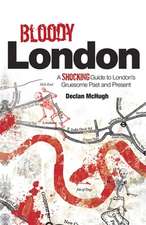Britain and Interwar Danubian Europe: Foreign Policy and Security Challenges, 1919-1936
Autor Dr Dragan Bakicen Limba Engleză Paperback – 28 noi 2018
| Toate formatele și edițiile | Preț | Express |
|---|---|---|
| Paperback (1) | 238.49 lei 6-8 săpt. | |
| Bloomsbury Publishing – 28 noi 2018 | 238.49 lei 6-8 săpt. | |
| Hardback (1) | 774.62 lei 6-8 săpt. | |
| Bloomsbury Publishing – 3 mai 2017 | 774.62 lei 6-8 săpt. |
Preț: 238.49 lei
Preț vechi: 306.13 lei
-22% Nou
Puncte Express: 358
Preț estimativ în valută:
45.66€ • 47.64$ • 38.27£
45.66€ • 47.64$ • 38.27£
Carte tipărită la comandă
Livrare economică 12-26 martie
Preluare comenzi: 021 569.72.76
Specificații
ISBN-13: 9781350092310
ISBN-10: 1350092312
Pagini: 288
Ilustrații: 24 bw illus
Dimensiuni: 156 x 234 x 14 mm
Greutate: 0.4 kg
Editura: Bloomsbury Publishing
Colecția Bloomsbury Academic
Locul publicării:London, United Kingdom
ISBN-10: 1350092312
Pagini: 288
Ilustrații: 24 bw illus
Dimensiuni: 156 x 234 x 14 mm
Greutate: 0.4 kg
Editura: Bloomsbury Publishing
Colecția Bloomsbury Academic
Locul publicării:London, United Kingdom
Caracteristici
Considers the Foreign Office policies in the wider context of Franco-Italian rivalries in the region, as well as in relation to tensions between the Little Entente and Hungary during the period
Notă biografică
Dragan Bakic is Research Fellow at the Institute for Balkan Studies, Serbia.
Cuprins
AcknowledgementsAbbreviationsIntroduction1. A New Europe or a "Balkanised Europe"? The British Dilemma, 1919-19212. The Attitudes and Calculations Determining British Policy towards Danubian Europe, 1921-19253. Managing Perpetual Crisis, 1925-19274. The Transitional Years, 1928-19325. The Quest for an Elusive Danubian Security, 1933-1936ConclusionNotes Bibliography
Recenzii
In all, this is an extraordinary work that makes a welcome contribution to the growing literature on interwar Danubian Europe. It will be of considerable interest to scholars of European studies, international relations, and diplomacy.
This is a well-researched, insightful and challenging critique of British inter-war foreign policy as diplomats and politicians struggled to find solutions to problems posed by the post-First World War settlement in Central Europe and the Balkans. Voices insisting that European peace was indivisible and that the affairs of Central Europe could not be dismissed as faraway and insignificant were ignored with tragic consequences, offering lessons that remain relevant today.
The British knew little about Eastern Central Europe between the two world wars, for only in Shakespeare does Bohemia have a coastline. Yet, as Dragan Bakic shows in this lucid and timely exposition, the region occupied by the successor states of the Hapsburg Empire played an important role in British foreign policy, which intersected with Britain's relations with the Great Powers at crucial moments.
In considering the diplomacy of interwar Europe from an unexpected angle Dragan Bakic helps to illuminate its complexities. Combining thorough research in British sources with previously unavailable or unused Yugoslav archives, this work is a valuable resource for those interested in both the period and in the wider workings of British diplomacy.
A welcome addition to an otherwise scant bibliography on British foreign policy in this part of Europe in the period before the Munich Conference ... An important book, grounded in excellent archival research, which opens many interesting questions ... As such, it should stimulate further research of the topic.
This is a well-researched, insightful and challenging critique of British inter-war foreign policy as diplomats and politicians struggled to find solutions to problems posed by the post-First World War settlement in Central Europe and the Balkans. Voices insisting that European peace was indivisible and that the affairs of Central Europe could not be dismissed as faraway and insignificant were ignored with tragic consequences, offering lessons that remain relevant today.
The British knew little about Eastern Central Europe between the two world wars, for only in Shakespeare does Bohemia have a coastline. Yet, as Dragan Bakic shows in this lucid and timely exposition, the region occupied by the successor states of the Hapsburg Empire played an important role in British foreign policy, which intersected with Britain's relations with the Great Powers at crucial moments.
In considering the diplomacy of interwar Europe from an unexpected angle Dragan Bakic helps to illuminate its complexities. Combining thorough research in British sources with previously unavailable or unused Yugoslav archives, this work is a valuable resource for those interested in both the period and in the wider workings of British diplomacy.
A welcome addition to an otherwise scant bibliography on British foreign policy in this part of Europe in the period before the Munich Conference ... An important book, grounded in excellent archival research, which opens many interesting questions ... As such, it should stimulate further research of the topic.











